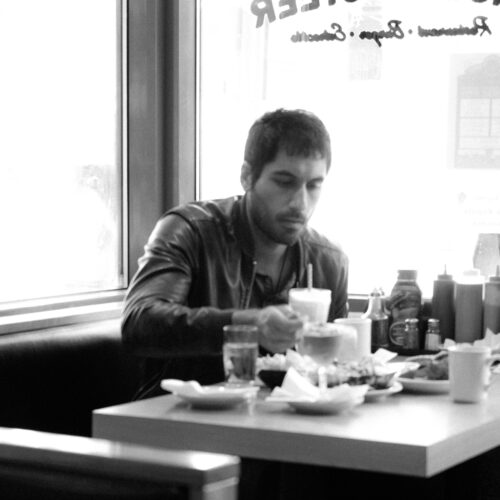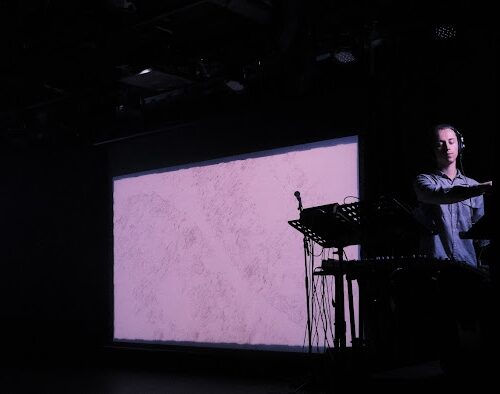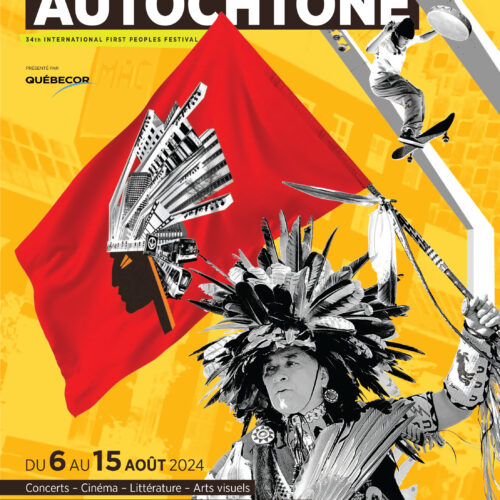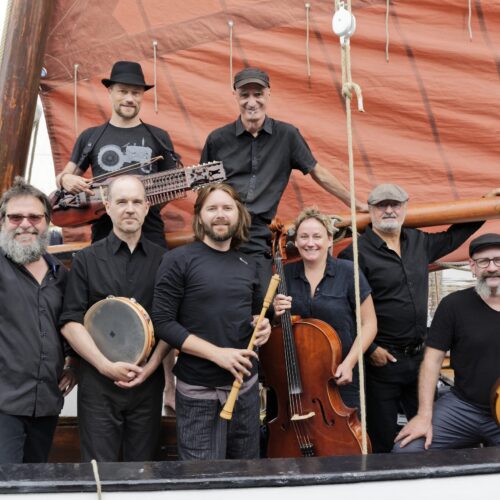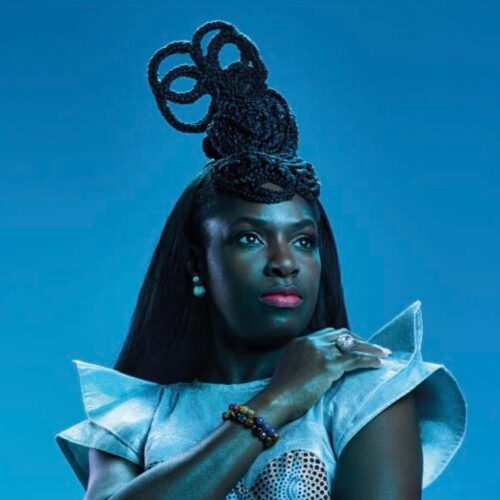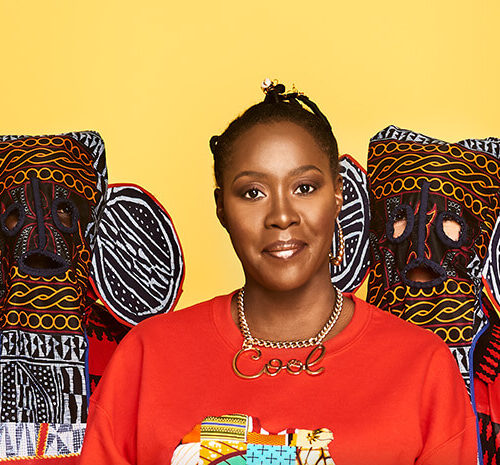Additional Information
We don’t need to introduce Lydia Lunch anymore. Underground icon and high priestess of the no wave genre, this elusive artist has never ceased to shape a (voluminous) disturbing, destabilizing, provocative, audacious and hostile work, whether it be through her music, her literary creations, her poetry or as an actress. Even today, at 63, she remains as relevant as ever in her impertinence.
From Teenage Jesus and the Jerks to Big Sexy Noise, 8-Eyed Spy and her multiple solo albums and collaborations, the Queen of Siam revisits her impressive musical career with her band Retrovirus, as part of the Taverne Tour.
A few days before her Montreal appearance, we had the pleasure of speaking with this living legend of counter-culture. Affable, generous, joking and animated by a passion that we feel is still burning, she talked to us about no wave and Retrovirus of course, but also about her relationship with death, some of her projects and her singular desire to sell all her work.
PAN M 360: You are often associated with the New York underground, how has this city influenced your work? And does it still influence it?
Lydia Lunch: How did I influence what happened in New York you mean? Okay, let’s be clear. I was first influenced by literature. So if I was influenced by the literature of Hubert Selby Jr. and his Last Exit to Brooklyn when I was 12. if I was influenced by the writings of Henry Miller, I was well prepared for what New York could be, should be, or would be. I already had a preconceived idea of what I was supposed to do before I got here, in a sense. I’ve lived in New York less than I have in other places, which is weird. That’s because I came here in ’76 until ’79, or ’80. I moved to Los Angeles for two years, London for two years, back to New York for four years, San Francisco, Pittsburgh, New Orleans, Barcelona for eight years… But as someone once said, maybe I am what New York once was, I don’t know….
PAN M 360: This city has changed a lot in the last 30 years. Do you think those underground art and music scenes of the ’70s and ’80s could exist today?
Lydia Lunch: If we want to make history, which I really like, the scenes are cyclical. For example, we would start with the ’20s in Paris, the ’30s maybe in Berlin, or the ’50s in Chicago, the ’60s in San Francisco, the ’70s in New York, London, Los Angeles, and then the ’80s… I don’t know what happened to music in the 80s, it went sideways….. I think with the arrival of the Internet, there was less urgency to be in a specific place, and everything became more expensive too. And then instead of clubs, which are gone now, there were bigger festivals. Everything is always changing. Things can’t stay the same. I mean, I wish it was Paris in the ’20s, but it’s not. You go anywhere, it’s not what it was. But there are always radical elements somewhere. I’ll give you one tiny example that I’ve been really excited about lately: some kids in high school IV and V at the Brooklyn Library consider themselves Luddites, they’re anti-technology, they read books, they write, and they don’t go online, and I’m thinking, “Now that’s a form of rebellion!” Because we know how soul-sucking electronic mania the Internet can be, and when young people reject it, it means they want a real life experience.
PAN M 360: You were and still are closely associated with the no wave movement. Can you tell us a bit about this scene? Was it even a scene?
Lydia Lunch: Honey, its whole history has been written, but let me define what no wave is. I still consider myself a no wave artist. When you hear punk rock, opera, classical, piano music, pop… you have an idea of what defines that sound. But with no wave, no; this genre doesn’t even have a relationship with itself. It’s much more dada or surreal, it’s discordant, it’s not necessarily audience friendly, and it’s generally not melodic. And as opposed to punk, for example, which was happening at the same time and was more of a social revolt, with no wave, most people were living an internal revolt. They had personal revolts; because of the city, because of the madness of America… It was more of a personal madness, I think.
PAN M 360: In the last few years, we’ve seen a sort of renaissance of the no-wave genre. What do you think about that?
Lydia Lunch: Well, for me it never went away. But I consider myself no wave because it defies categorization. I mean I’m always happy when something is discordant, or something is shredded, or something is irritating. But I’ve also done swamp rock, I’ve done big band music… I don’t expect anyone to make music for me, I make it for my many selves! That’s why I usually try to have a different flavor.
PAN M 360: You’ve created a lot of things and looking back on your work, are there any missed opportunities or things you would have liked to do? And that you still want to do?
Lydia Lunch: Well, that’s a very good question. No, because what would I have missed (laughs). The thing is, I’m a conceptualist. So I mean, first of all, I have a concept, a musical concept. Then I try to find the person who I think will be the best to illustrate that sound. I never think “oh I want to work with this person.” I wouldn’t know who to work with. It’s not that I’ve worked with everyone either, but I don’t sit down and think “oh, I’d like to do something innovative.” No. I’d like to continue to collaborate with those who make the most sense for a specific project. What’s interesting about Retrovirus, because we cover so many decades, is that a lot of this music has never been played live, or only very, very briefly. So it’s interesting to have musicians who can perform these tunes, but take them beyond that, in a more… I wouldn’t say sophisticated way, but in an even more beautiful and punishing way. (laughs)
PAN M 360: Speaking of Retrovirus, we just saw Bob Bert on drums with John Spencer in Montreal two weeks ago. Will he still be behind the drums for the Retrovirus show at the Tavern Tour?
Lydia Lunch: No, we have Kevin Shea now. You know, this is the longest set up I’ve ever had. Because usually I have a concept, I find the collaborators, we do a tour or we do a record and then we move on to the next (concept) please! But with the amount of songs in my repertoire that we can draw from, it might be that Retrovirus becomes a new band from time to time (laughs). And so now we have a new drummer, mainly because Bob is involved with John Spencer for a long time, so we had to get Kevin Shea, and that made the band sound even more brutal. I say that with great pleasure! (laughs) We open the show with “War Pigs” by Black Sabbath! I stay true to the lyrics but coming from me, coming out of my mouth, they take on another meaning, they are completely distorted.
PAN M 360: I wonder what Ozzy would think of it…
Lydia Lunch: Is he still able to hear anything? (laughs)
PAN M 360: And I believe that Weasel Walter still plays the guitar and Tim Dahl the bass?
Lydia Lunch: Of course! Weasel and Jim, yeah!
PAN M 360: Considering that you have written more than 300 songs…
Lydia Lunch: 400! Who’s counting? Not even 10 a year, I’m slacking! (laughs)
PAN M 360: Ok, considering you’ve written over 400 songs, are there any you’ve never played live on this tour?
Lydia Lunch: We’re playing songs from my catalog that we’ve never played before, yes. But we don’t write new songs when there are so many choices. If I’m going to write new songs, I’m going to have new collaborators, like with Cypress Grove, or my Fistful of Desert Blues, and I also have an unreleased jazz noir album with Sylvia Black, who is an incredible singer/songwriter (in French in the interview). I have a record with Tim Dahl’s band, Grid, with saxophone, bass and something more like spoken word, which is not out yet. So there’s no reason to put new music on Retrovirus; it’s the “Retro” virus! But what’s interesting is that we can do songs that we’ve never done before. For example, we’re doing three or four songs that we’ve never played before for this tour.
PAN M 360: A few years ago, we heard that you wanted to sell the rights of all your works. How did that happen?
Lydia Lunch: I’m always there with my hand out, waiting for gold to fall in (laughs). You know, I sold my archive to New York University, but it was just physical debris. I don’t know how, but from a very young age, I managed to keep the rights to everything I did, unlike so many of my contemporaries. And I don’t know how I was so thoughtful at 17. I own everything, which is great, but nobody wants to buy it (laughs). It’s all there. You never know… But you know, why would they be interested in my work when they spend 150 million fucking dollars on the Red Hot Chili Peppers? Ew! In-croy-able… I mean, I never wrote “Under The Bridge” and they never wrote “Orphans.” I don’t know what to say… I just wish somebody would take it off my hands and do something with it. In the 400 songs, I think there’s a lot of scary ones that could easily be in some of these crime shows, which I’m obsessed with.
PAN M 360: So there were no offers?
Lydia Lunch: Well, there have been some offers but not what I wanted…. I have to try to hold out. It also has to be with the right people. You know, it’s not like a storage unit that we would auction off. And if it was, who would come? (laughs). Look, I have to take everything with a grain of salt like I always have. For example, last year I received a grant from Middle Tennessee State University in Murfreesboro, which has the oldest and largest music archive in America. They offered it to me, and I laughed, and said, “So what does that mean? And who else got it?” They said, “You know, it means a few thousand dollars, you come in, you jog, you get a plaque…” And the only other two people who got it were Lamont Dozier, who wrote a lot of songs for Motown, I love Motown, and Barry Gibb! I hate the Bee Gees! (laughs). So it was me, Barry Gibb and Lamont Dozier! It was great! Likewise, I’ve taught at universities before and having dropped out of school in high school, I just thought “I like this!” It’s so ridiculous when you think about it! That’s really what no wave is all about: absurdity! I love the absurdity of it. I mean, I’m more proud of my gun training than I am of a scholarship! (laughs). I’m an American, I have gun training you know! (laughs)
PAN M 360: How did the recent death of Tom Verlaine affect you? Were you friends?
Lydia Lunch: Affected? Ah! I’m surprised that everyone is still alive! I’m kidding, but the thing is, people have a bad attitude about death. We don’t cry for the dead, we cry for ourselves, like “oh, I’m not going to have that anymore…”. We have to appreciate what people have given us in life. That’s why we have to be very grateful, every day. Because everybody is going to die. You don’t have to mourn their departure, you just have to appreciate what they gave you, what they did for you, what they gave for the culture or whatever. I mean, Tom Verlaine was not a friend of mine, but I think his contribution to the first two Television albums was great. How much more does a man have to do before he can rest in peace in that black velvet room? (laughs) I’m not ready to go but… you never know!
PAN M 360: Please wait until after the Montreal show.
Lydia Lunch: At least I’ll wait until after this interview! (laughs) I’m not going anywhere anyway, except to go in circles like I always do. So I’ll be circling around your place in a few days, I’ve got a lot of guts!

